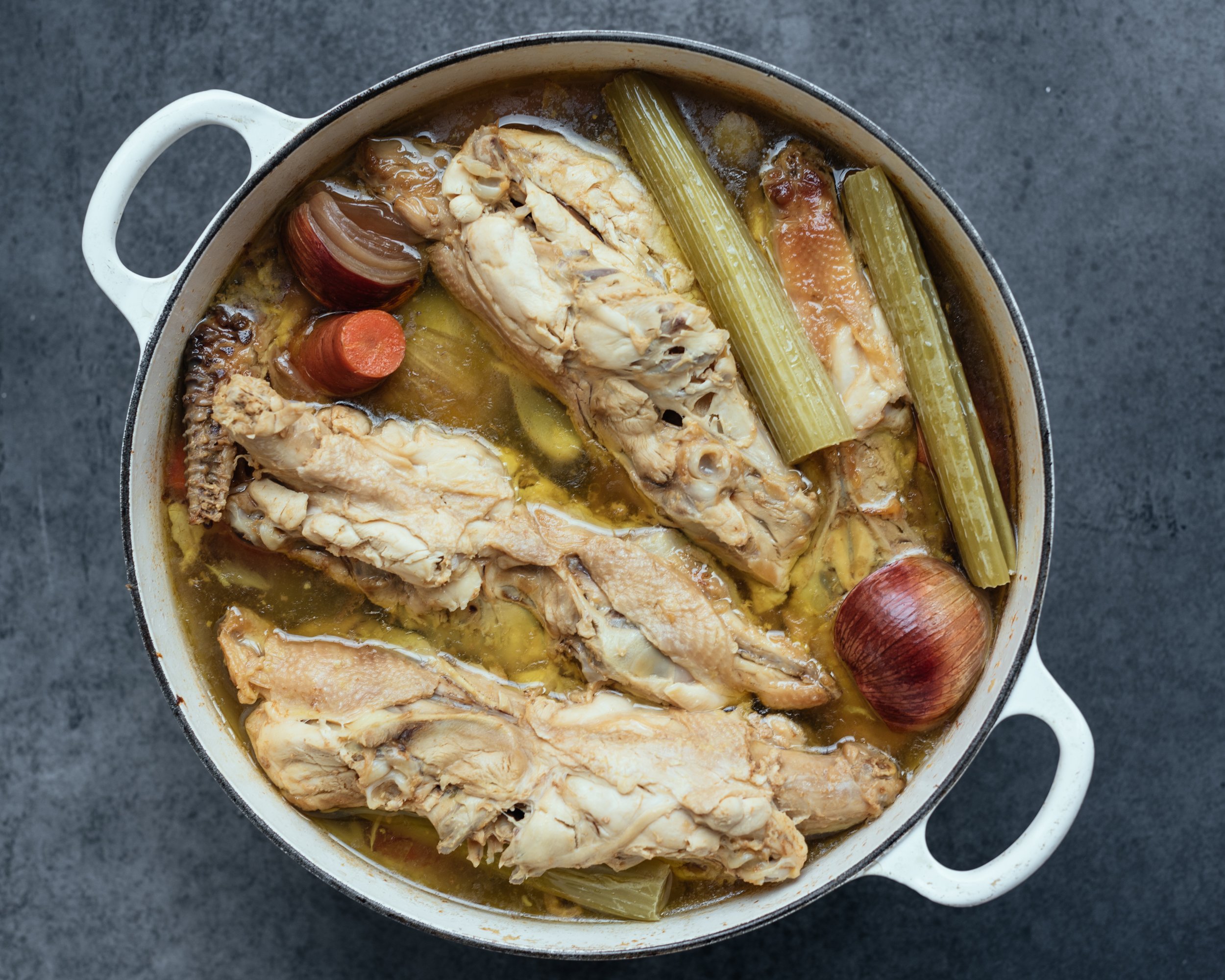Bone Broth for Pregnancy: Crucial Nutrients for Prenatal Health
Wiki Article
The Significance of Healthy And Balanced Food: Why Bone Broth Is a Terrific Selection for Infants
Bone broth stands out as a nutrient-dense option, offering crucial vitamins and minerals that sustain development and advancement. What are the best ways to introduce bone broth to your little one?Nutritional Conveniences of Bone Broth for Newborns
When you present bone broth to your infant's diet plan, you're supplying a nutrient-dense food that offers countless wellness advantages. Loaded with vital nutrients, bone broth has calcium, magnesium, and phosphorus, which support your baby's growing bones. It's likewise abundant in collagen, aiding in the development of healthy skin, joints, and connective cells.Furthermore, bone broth is an exceptional source of amino acids like glycine and proline, which play a significant role in overall development and muscle growth. These nutrients aid promote a solid immune system, establishing a strong foundation for your baby's health.
Furthermore, bone broth is simple to digest, making it a mild alternative for your child. By incorporating this wholesome food right into their meals, you're guaranteeing they get crucial nutrients essential for their overall well-being. So, go ahead and make bone broth a staple in your infant's diet!
Exactly How Bone Broth Sustains Digestion
Bone broth is loaded with vital nutrients that can truly profit your child's food digestion. It promotes digestive tract health and aids with nutrient absorption, making it a fantastic addition to their diet regimen. By incorporating bone broth, you're establishing the stage for a much healthier gastrointestinal system.Nutrient-Rich Structure
One of the most nutrient-rich foods you can introduce to your infant's diet regimen is bone broth, which is loaded with important minerals and amino acids that sustain healthy digestion. Rich in collagen, bone broth aids reinforce your child's gut lining, making it less complicated for their body to absorb nutrients. By integrating bone broth into your infant's meals, you're giving them a wholesome food that nurtures their digestion system successfully.Promotes Gut Health And Wellness
As you present bone broth into your baby's diet regimen, you'll discover it not just nourishes but likewise promotes intestine health and wellness efficiently. Rich in jelly, bone broth aids soothe the digestion tract, lowering swelling and sustaining a healthy intestine lining. This is crucial for infants, as a well balanced gut atmosphere lays the structure for general health. Additionally, the amino acids found in bone broth, such as glycine, aid in food digestion and can assist protect against usual stomach difficulties. By integrating this nourishing liquid, you're providing your baby with necessary nutrients that add to a thriving digestion system. Inevitably, a healthy and balanced gut can affect every little thing from immunity to mood, making bone broth an outstanding selection for your child.Aids Nutrient Absorption
Presenting bone broth not just supports digestive tract health and wellness but additionally plays a significant duty in helping vitamins and mineral absorption. When you provide your infant bone broth, you're offering an abundant source of minerals and amino acids that improve their digestive processes. The jelly in bone broth assists to soothe the intestine cellular lining, enhancing its ability to soak up essential nutrients.Strengthening the Body Immune System With Bone Broth

By incorporating bone broth into your infant's diet, you're offering an all-natural resource of nourishment that promotes health. Take into consideration making bone broth a staple in your infant's dishes, as it can play an essential function in their immune wellness and growth.
Easy Ways to Incorporate Bone Broth Into Baby's Diet plan
Integrating bone broth into your child's diet regimen can be basic and satisfying. You can likewise make use of bone broth as a base for soups or stews that you prepare for the family, guaranteeing your baby obtains a taste of delicious, healthy dishes.If your infant delights in grains, consider cooking rice or quinoa in bone broth rather of water for additional nourishment. These approaches will certainly help your child gain the advantages of bone broth easily!
Homemade vs. Store-Bought Bone Broth: What to Choose
Which is much better for your infant: homemade or store-bought bone broth? Homemade bone broth uses you full control over the ingredients. You can select high-grade bones, organic veggies, and natural herbs, guaranteeing your infant gets the most nutrients without ingredients or preservatives. Plus, making it in the house can be a satisfying experience, enabling you to bond with your infant while preparing wholesome food.On the various other hand, store-bought options are hassle-free and save you time. Nevertheless, they usually contain preservatives and may not match the depth of taste and nourishment you obtain from homemade broth. If chicken bone broth you choose store-bought, seek brand names that are organic and free from additives.
Inevitably, if you have the moment and resources, homemade bone broth is the premium option for your child's health. If you're brief promptly, select a high quality store-bought alternative as a back-up.
Age-Appropriate Bone Broth Serving Pointers
As your baby grows, it is necessary to customize bone broth serving tips to their developmental stage. For infants around six months, begin with a couple of does of watered down bone broth. Mix it with water or breast milk to make it easier for them to digest. As they become familiar with flavors, you can progressively introduce thicker broth by reducing the dilution.By the time your little one is around a year old, consider offering bone broth as a standalone drink or blending it right into soups and stews. Simply make sure to maintain the broth low in sodium.
Various Other Healthy Foods to Couple With Bone Broth for Babies
When you're aiming to boost the nutritional value of bone broth for your infant, consider combining it with nutrient-dense vegetables like carrots and spinach. Whole grain choices, such as quinoa or brown rice, can likewise add appearance and fiber. In addition, including healthy and balanced protein sources like shredded chicken or lentils will certainly round out the meal well.
Nutrient-Dense Veggies
Nutrient-dense vegetables are a great addition to bone broth for babies, boosting both flavor and nutrition. Incorporating veggies like carrots, spinach, and sweet potatoes can enhance the vitamin and mineral web content of your broth.You can quickly blend these veggies into the broth or offer them as soft, prepared pieces together with it. This not only introduces new tastes but additionally motivates your youngster to enjoy a range of nutrients. By pairing nutrient-dense vegetables with bone broth, you're laying the foundation for a healthy and balanced diet right from the begin.
Whole Grain Options

Healthy Healthy Protein Resources
Bone broth sets incredibly with numerous healthy and balanced protein resources, further improving your infant's diet plan. Attempt adding soft, prepared lentils; they're nutrient-dense and jam-packed with protein. You can additionally blend in shredded chicken or turkey, which are easy for your little one to absorb. If you're trying to find plant-based options, think about mashed tofu or pureed chickpeas-- both give superb healthy protein without overwhelming tastes. Eggs, when introduced securely, are one more fantastic selection; they're flexible and loaded with nutrients. Inevitably, blending in some well-cooked quinoa can include a wonderful texture and extra healthy protein. By incorporating these healthy and balanced protein sources with bone broth, you're giving your baby a balanced, nourishing meal that supports their development and advancement.Often Asked Inquiries
Can Bone Broth Cause Allergies in Newborns?
Yes, bone broth can trigger sensitive responses in babies, especially if they're sensitive to particular active ingredients. Always consult your doctor prior to introducing brand-new foods and screen for any kind of indications of allergies after feeding.Just How Should Bone Broth Be Saved for Babies?
You should save bone broth in impermeable containers, either in the fridge for as much as a week or in the freezer for approximately 3 months. chicken bone broth. Constantly thaw it appropriately prior to offering to your infantIs It Safe to Provide Bone Broth to Premature Infants?
It's vital to consult your pediatrician before introducing bone broth to premature infants. They'll analyze your infant's certain health needs and assure it's safe, considering their one-of-a-kind nutritional needs and developing phase. Constantly prioritize expert suggestions.What Are the Signs of Intolerance to Bone Broth in Infants?
When introducing bone broth, look for signs like fussiness, breakout, diarrhea, or throwing up. If your infant reveals any of these reactions, it's finest to consult a pediatrician before proceeding to use it.Can Bone Broth Be Utilized as a Dish Substitute for Newborns?
No, you should not utilize bone broth as a dish replacement for babies. It does not have important nutrients needed for their growth. Instead, incorporate it into their diet along with balanced dishes for added nutrients and taste.Report this wiki page